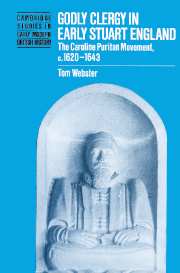Book contents
- Frontmatter
- Contents
- Acknowledgments
- List of abbreviations
- Introduction
- Part I Society, clerical conference and the Church of England
- 1 Clerical education and the household seminary
- 2 Profitable conferences and the settlement of godly ministers
- 3 Fasting and prayer
- 4 Clerical associations and the Church of England
- Part II The godly ministry: piety and practice
- Part III ‘These uncomfortable times’: conformity and the godly ministers 1628–1638
- Part IV ‘These Dangerous Times’: the Puritan Diaspora 1631–1643
- Index
- Cambridge Studies in Early Modern History
3 - Fasting and prayer
Published online by Cambridge University Press: 04 November 2009
- Frontmatter
- Contents
- Acknowledgments
- List of abbreviations
- Introduction
- Part I Society, clerical conference and the Church of England
- 1 Clerical education and the household seminary
- 2 Profitable conferences and the settlement of godly ministers
- 3 Fasting and prayer
- 4 Clerical associations and the Church of England
- Part II The godly ministry: piety and practice
- Part III ‘These uncomfortable times’: conformity and the godly ministers 1628–1638
- Part IV ‘These Dangerous Times’: the Puritan Diaspora 1631–1643
- Index
- Cambridge Studies in Early Modern History
Summary
‘Fasting and Prayer’ has been a constant refrain in our examination of clerical sociability. We began with a fast at Hatfield Broad Oak and have noticed fasting in the context of the settlement of ministers and in other decision-making meetings. The ambiguities of clerical association are perhaps strongest in this field, and for this reason the practice deserves particular attention. Unlike the activities discussed earlier, fasting and prayer had a set place within the public worship of the church in addition to its place in voluntaristic religious life.
Fasting is also, to an extent greater than the rituals of sociability already discussed, an aspect of voluntary religion that is at least as likely to occur in mixed groups of laity and ministers as among strictly clerical groups. John Stalham was attracted to his Terling congregation in 1632 by ‘that inviting support which was given of you that you were a fasting and praying people’. A letter from their former pastor, Thomas Weld, written upon his arrival in New England backs this up. After celebrating the Congregational government of the colony, the very next thing he celebrated was that ‘Fast days & holy days & holy fest days and all such things by A[u]thority Commanded & performed according to the precise rule’. Fasting had been an important part of pre-Tridentine Catholicism and remained a practice that characterised post-Tridentine English Catholicism. It has been argued that enthusiastic Protestant fasting was partly a response to this continued example, and there may be an element of truth in this, but the Protestant fast, with all its familiar features, had been described as early as the middle of the sixteenth century.
- Type
- Chapter
- Information
- Godly Clergy in Early Stuart EnglandThe Caroline Puritan Movement, c.1620–1643, pp. 60 - 74Publisher: Cambridge University PressPrint publication year: 1997
- 1
- Cited by



